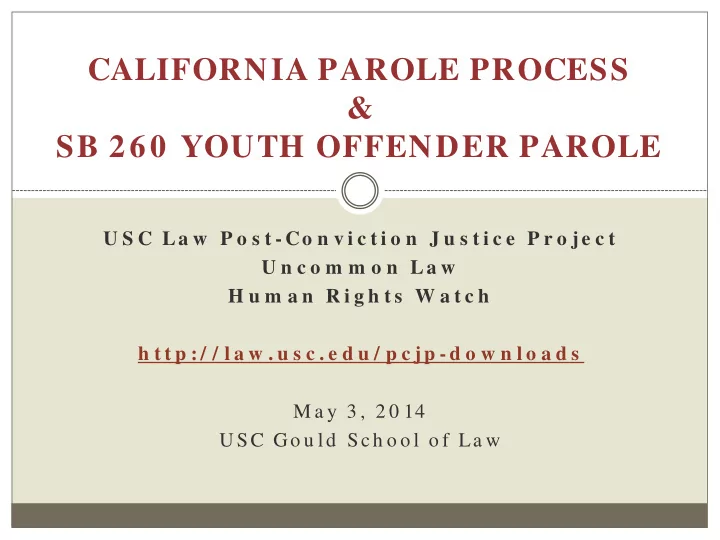

CALIFORNIA PAROLE PROCESS & SB 260 YOUTH OFFENDER PAROLE U S C La w P o s t - Co n v i c t i o n J u s t i c e P r o je c t U n c o m m o n La w H u m a n R i g h t s W a t c h h t t p : / / l a w . u s c . e d u / p c jp - d o w n l o a d s M a y 3 , 2 0 14 U SC Go u ld Sch o o l o f La w
Senate Bill 260 YO U TH O F F E N D E R P A R O LE H E A R I N G S
SB260 OVERVIEW Penal Code §§ 3041(a), 3046(c), 3051 • Effective Date: January 1, 2014 • Backlog deadline: July 1, 2015 • Estimated 5,000-6,000 eligible inmates • Three Major Components: • Six Year Consultation (all ISL inmates) Early Parole/ Release Eligibility Youth Offender Parole Hearing
Six Year Consultation Penal Code § 30 41(a) Applies to all ISL prisoners (replaces doc hearing) • Sixth year prior to MEPD • Requires the Board to: • Review and document activities and conduct relevant to parole • Provide Information on • parole hearing process • legal factors relevant to suitability or unsuitability • Provide individualized recom m endations • Work Assignments • Rehabilitative Programming • Institutional Behavior • Written Positive/ Negative Findings and Recommendation • Backlog (“as resources allow”)
Eligibility Under 18 at the time of the commitment offense(s) • EXCLUSIONS • LWOP (PC 190.5) but not those resentenced under 1170(d)(2) • Three-Strikes life sentence with two or more serious or violent • strikes (PC §§ 1170.12; 667(b)-(i)) One-strike sex offenses (PC § 667.61) • Post-18 life sentence (or malice crime) •
Parole Eligibility Eligibility for Parole Controlling Offense Hearing and Release If the longest term 15th year of incarceration is determ inate (not “life”) If the longest term 20th year of incarceration is a life sentence with a m inim um of less than 25 years 25th year of incarceration If the longest term is 25-to-life
SIGNIFICANT POINTS NO MATRIX • Years of Incarceration • Includes all custody credits • Includes incarceration on any term • Eligible for Post-Conviction Credits • Does Not Impact Release on Determinate Term • Single-track parole process • Marsy’s Law applies to denials • Same Governor Review Process • Murder • Other Life Crimes •
YOUTH OFFENDER PAROLE HEARING GREAT WEIGHT STANDARD • Diminished Culpability of Juveniles as Compared to Adults • Adolescent Brain (Under)Development / Executive Functioning • Inability to Escape Violent or Dysfunctional Environment • Lessened Ability to Participate in Defense • Greater Potential for Change and Rehabilitation • Hallmark Features of Youth • Impulsivity, Impetuosity • Inability to Appreciate Consequences of Behavior • More Likely to Engage in Risky Behavior • Susceptible to Influence, Psychological Damage, Peer Pressure • Subsequent Growth and Maturity • Maturity leads to that considered reflection which is the • foundation for “remorse, renewal, rehabilitation” ( Graham )
BPH IMPLEMENTATION PROCESS Scheduling Hearings • YOs who previously met MEPD • Scheduled hearing becomes YOPH • Petition to Advance for those with previous denial/ reversal • YOs who have not yet met MEPD • Begin to schedule for hearings in the fall (???) • Statutory deadline (July 15, 2014) likely to be extended • BPH Psychological Evaluations • Same risk assessments (disadvantage youth) • Psychologists must take into consideration diminished culpability • of juveniles, hallmark features of youth, and subsequent growth and maturity. Promulgating Regulations •
Recommend
More recommend